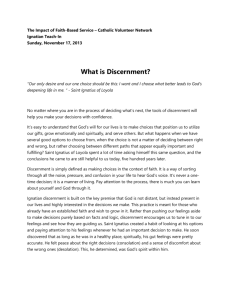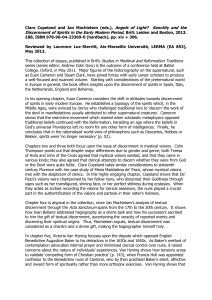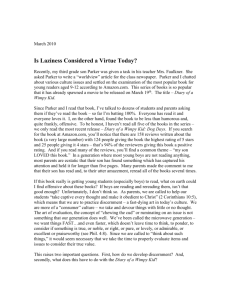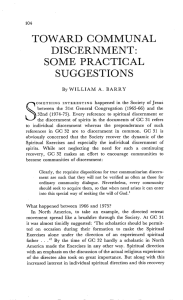Roles people play when in a group setting
advertisement
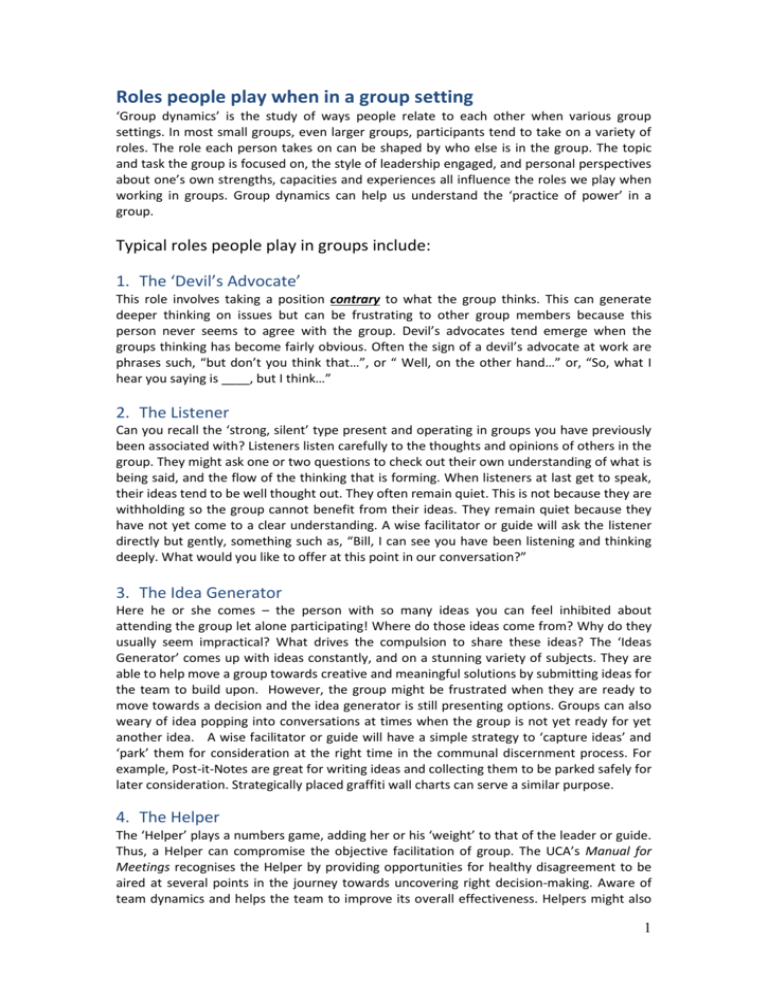
Roles people play when in a group setting ‘Group dynamics’ is the study of ways people relate to each other when various group settings. In most small groups, even larger groups, participants tend to take on a variety of roles. The role each person takes on can be shaped by who else is in the group. The topic and task the group is focused on, the style of leadership engaged, and personal perspectives about one’s own strengths, capacities and experiences all influence the roles we play when working in groups. Group dynamics can help us understand the ‘practice of power’ in a group. Typical roles people play in groups include: 1. The ‘Devil’s Advocate’ This role involves taking a position contrary to what the group thinks. This can generate deeper thinking on issues but can be frustrating to other group members because this person never seems to agree with the group. Devil’s advocates tend emerge when the groups thinking has become fairly obvious. Often the sign of a devil’s advocate at work are phrases such, “but don’t you think that…”, or “ Well, on the other hand…” or, “So, what I hear you saying is ____, but I think…” 2. The Listener Can you recall the ‘strong, silent’ type present and operating in groups you have previously been associated with? Listeners listen carefully to the thoughts and opinions of others in the group. They might ask one or two questions to check out their own understanding of what is being said, and the flow of the thinking that is forming. When listeners at last get to speak, their ideas tend to be well thought out. They often remain quiet. This is not because they are withholding so the group cannot benefit from their ideas. They remain quiet because they have not yet come to a clear understanding. A wise facilitator or guide will ask the listener directly but gently, something such as, “Bill, I can see you have been listening and thinking deeply. What would you like to offer at this point in our conversation?” 3. The Idea Generator Here he or she comes – the person with so many ideas you can feel inhibited about attending the group let alone participating! Where do those ideas come from? Why do they usually seem impractical? What drives the compulsion to share these ideas? The ‘Ideas Generator’ comes up with ideas constantly, and on a stunning variety of subjects. They are able to help move a group towards creative and meaningful solutions by submitting ideas for the team to build upon. However, the group might be frustrated when they are ready to move towards a decision and the idea generator is still presenting options. Groups can also weary of idea popping into conversations at times when the group is not yet ready for yet another idea. A wise facilitator or guide will have a simple strategy to ‘capture ideas’ and ‘park’ them for consideration at the right time in the communal discernment process. For example, Post-it-Notes are great for writing ideas and collecting them to be parked safely for later consideration. Strategically placed graffiti wall charts can serve a similar purpose. 4. The Helper The ‘Helper’ plays a numbers game, adding her or his ‘weight’ to that of the leader or guide. Thus, a Helper can compromise the objective facilitation of group. The UCA’s Manual for Meetings recognises the Helper by providing opportunities for healthy disagreement to be aired at several points in the journey towards uncovering right decision-making. Aware of team dynamics and helps the team to improve its overall effectiveness. Helpers might also 1 be unwilling to disagree with the facilitator or other group members when they should. When this happens, Helpers can undermine a communal discernment process. 5. The Clarifier In a role something similar to the Listener, a Clarifier asks questions or seeks additional information. However, usually the Clarifier is motivated by attempting ensure assignments, roles, or decisions are clearly understood by everyone. Unlike Listeners, Clarifiers tend to work on behalf of the whole group making sure every-one is on the ‘same page’. While this can be helpful, a wise guide or facilitator is well prepared for this task. Thus, having a strategy to constantly check-in’ on shared or common understandings throughout the communal discernment journey ‘control’ the Clarifiers and empowers everyone in the group. 6. The Mediator “Well, just checking - I wonder if you heard what I did when ____________ said so and so?” An alert discernment guide or facilitator knows there’s a Mediator at work when this sort of thing is said. The Mediator senses discord arising and works to smooth out conflicts. When the Mediator role is played well in a group, positive relationships between the group’s members are nourished and maintained. However, the Mediator can be more relationshiporiented and less task-oriented, so keeping persons who take this role focused on the task of communal discernment is a priority for discernment guides. 7. The Joker Everyone loves the joker who smiles and laughs, is fun and light-hearted. Groups work well when there is a sense of humour about the relationships and the ways in which the tasks are engaged. But the Joker can also be a distraction to the task and cause the group to lose focus. Jokers can draw attention away from the journey of communal discernment towards themselves. They like to be at the centre of any stage! Skilful guides or facilitators can sense when the Joker’s contribution is needed and when it’s time to move on. Sometimes, a discreet word can provide the guidance the joker needs to both participate him or herself and allow others to do so, too. 8. The Sniper Although everyone in the group is aware that there will be differences of perspective and opinion, almost nobody is aware of the Sniper lurking in their midst. The Sniper lives to ‘shoot down’ ideas. Of course some ideas need to be shot down. When the Sniper gets everything lined up – pow! He or she ‘shoots’ to kill the idea or suggestion dead in it tracks. Others may sense that ideas and suggestions deserve further consideration. Engaging potential Snipers in deeper consideration of their motives and reasons for the conclusions they might offer is one way to take the sting out this role, as well as to gain valuable input to the group‘s thinking. Careful inclusion can flush the Sniper out of hiding and into the open where a healthy, engaging group dynamic will include her or him. Snipers often act out of a sense of disempowerment. Keeping a close watch on known or potential snipers and seeking to empower them by inviting their comment and opinions through a communal discernment journey will pay off in the final movements as the group seeks to uncover a common mind. 9. Decision Maker Decision Makes arrives in the group with goal in mind – to get ‘the decision’ made! Discernment on the other had is not about making decision. Rather, discernment is about uncovering together the Way ahead. A Decision make drives the group to make decisions 2 and act. Decision makers, never-the-less, are an essential component of a well-functioning team. The risk of giving way to the decision maker too early in a communal discernment process is that thy will overwhelm truly Christian communal discernment. They may not give enough time for the necessary ‘uncovering’ of God’s Way forward. Consequently, any plans they come up with will be flawed because the proper process as not allowed space or time to run its course. A wise guide or facilitator calls the group back to its goal – to discern (uncover) God in this journey. 10.The Dominator Dominator’s can appear as if they have everything already sewn up. They seem to attract power and office to themselves. But for some at least, the urge to dominate can be a cover up for various insecurities. A skilled guide or facilitator will take time to observe the Dominator, determining if insecurities are prompting the dominating behaviours. If so, then the use of questions to direct attention back to the issue or to reengage the group in a wider discussion will work to reduce the Dominator’s distraction and interference. Dominators’ can provide good leadership in a group discussion, but they can also make it very difficult for the group’s members to participate. John Emmett February 2013. 3


